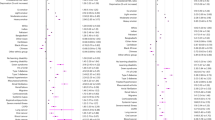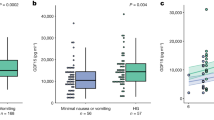Abstract
The developmental origins of health and disease hypothesis proposes that early exposure to adverse conditions during fetal development and early life have strong detrimental consequences on long-term health and susceptibility to chronic diseases. We conducted a systematic review to critically appraise Barker’s highest cited publications using the risk-of-bias assessment tool (ROBINS-I) and investigate effects of overadjustment by later body weight. Our findings revealed that all included studies displayed high risks of bias, with particular concerns regarding confounding (8/8), selection of reported results (8/8), classification of exposure (7/8), selection of participants (5/8) and high rates of missing data (ranged from 15 to 87%). Later body weight was over-adjusted in most (6/8) of the studies. As all studies displayed high bias risk due to confounding, missing data and overadjustment, evidence is insufficient to support causal relationships between low birthweight and adult disease, warranting caution in clinical application.
Protocol registration
PROSPERO CRD42023433179
This is a preview of subscription content, access via your institution
Access options
Subscribe to this journal
Receive 12 print issues and online access
$259.00 per year
only $21.58 per issue
Buy this article
- Purchase on Springer Link
- Instant access to full article PDF
Prices may be subject to local taxes which are calculated during checkout


Similar content being viewed by others
References
Sterne JA, Hernán MA, Reeves BC, Savović J, Berkman ND, Viswanathan M, et al. ROBINS-I: a tool for assessing risk of bias in non-randomised studies of interventions. BMJ. 2016;355:i4919 https://doi.org/10.1136/bmj.i4919.
Sterne JAC, Savović J, Page MJ, Elbers RG, Blencowe NS, Boutron I, et al. RoB 2: a revised tool for assessing risk of bias in randomised trials. BMJ. 2019;366:l4898 https://doi.org/10.1136/bmj.l4898.
Barker DJ. The origins of the developmental origins theory. J Intern Med. 2007;261:412–7. https://doi.org/10.1111/j.1365-2796.2007.01809.x.
Barker DJP, Osmond C, Golding J, Kuh D, Wadsworth MEJ. Growth in utero, blood pressure in childhood and adult life, and mortality from cardiovascular disease. BMJ. 1989;298:564–7. https://doi.org/10.1136/bmj.298.6673.564.
Barker DJP, Osmond C, Winter PD, Margetts B, Simmonds SJ. Weight in infancy and death from ischaemic heart disease. Lancet. 1989;334:577–80. https://doi.org/10.1016/S0140-6736(89)90710-1.
Campisi SC, Carbone SE, Zlotkin S. Catch-up growth in full-term small for gestational age infants: a systematic review. Adv Nutr. 2019;10:104–11. https://doi.org/10.1093/advances/nmy091.
Huxley R, Neil A, Collins R. Unravelling the fetal origins hypothesis: is there really an inverse association between birthweight and subsequent blood pressure? Lancet. 2002;360:659–65. https://doi.org/10.1016/S0140-6736(02)09834-3.
Kramer MS, Zhang X, Dahhou M, Yang S, Martin RM, Oken E, et al. Does fetal growth restriction cause later obesity? Pitfalls in analyzing causal mediators as confounders. Am J Epidemiol. 2017;185:585–90. https://doi.org/10.1093/aje/kww109.
Ananth CV, Schisterman EF. Confounding, causality, and confusion: the role of intermediate variables in interpreting observational studies in obstetrics. Am J Obstet Gynecol. 2017;217:167–75. https://doi.org/10.1016/j.ajog.2017.04.016.
Elmrayed S, Metcalfe A, Brenner D, Wollny K, Fenton TR. Are small-for-gestational-age preterm infants at increased risk of overweight? Statistical pitfalls in overadjusting for body size measures. J Perinatol. 2021;41:1845–51. https://doi.org/10.1038/s41372-021-01050-5.
Fenton TR, Nasser R, Creighton D, Elmrayed S, Tang S, Gillis C, et al. Critical examination of relationships between early growth and childhood overweight in extremely preterm infants. J Perinatol. 2021;41:2774–81. https://doi.org/10.1038/s41372-021-01182-8.
Fenton TR, Elmrayed S, Scime NV, Tough SC, Pinto J, Sabet F, et al. Small for date preterm infants and risk of higher blood pressure in later life: a systematic review and meta-analysis. Paediatr Perinat Epidemiol. 2023;37:458–72. https://doi.org/10.1111/ppe.12955.
Elford J, Whincup P, Shaper AG. Early life experience and adult cardiovascular disease: longitudinal and case-control studies. Int J Epidemiol. 1991;20:833–44. https://doi.org/10.1093/ije/20.4.833.
Paneth N, Ahmed F, Stein AD. Early nutritional origins of hypertension: a hypothesis still lacking support. J Hypertens Suppl. 1996;14:S121–9.
Tu YK, West R, Ellison GTH, Gilthorpe MS. Why evidence for the fetal origins of adult disease might be a statistical artifact: the ‘reversal paradox’ for the relation between birth weight and blood pressure in later life. Am J Epidemiol. 2005;161:27–32. https://doi.org/10.1093/aje/kwi002.
EIford J, Shaper AG, Whincup P. Early life experience and cardiovascular disease - ecological studies. J Epidemiol Community Health 1992;46:(1978) https://doi.org/10.1136/jech.46.1.1-a.
Bertens LCM, Burgos Ochoa L, Van Ourti T, Steegers EAP, Been JV. Persisting inequalities in birth outcomes related to neighbourhood deprivation. J Epidemiol Community Health. 2020; 74:(1978-239). https://doi.org/10.1136/jech-2019-213162.
White PA, Awad YA, Gauvin L, Spencer NJ, McGrath JJ, Clifford SA, et al. Household income and maternal education in early childhood and risk of overweight and obesity in late childhood: findings from seven birth cohort studies in six high-income countries. Int J Obes. 2022;46:1703–11. https://doi.org/10.1038/s41366-022-01171-7.
Hemmingsson E, Nowicka P, Ulijaszek S, Sørensen TIA. The social origins of obesity within and across generations. Obes Rev. 2023;24:13514 https://doi.org/10.1111/obr.13514.
Huang C, Li J, Qin G, Liew Z, Hu J, László KD, et al. Maternal hypertensive disorder of pregnancy and offspring early-onset cardiovascular disease in childhood, adolescence, and young adulthood: a national population-based cohort study. PLoS Med. 2021;18:e1003805 https://doi.org/10.1371/journal.pmed.1003805.
Kurbasic A, Fraser A, Mogren I, Hallmans G, Franks PW, Rich-Edwards JW, et al. Maternal hypertensive disorders of pregnancy and offspring risk of hypertension: a population-based cohort and sibling study. Am J Hypertens. 2019;32:331–4. https://doi.org/10.1093/ajh/hpy176.
Chivese T, Haynes MC, van Zyl H, Kyriacos U, Levitt NS, Norris SA. The influence of maternal blood glucose during pregnancy on weight outcomes at birth and preschool age in offspring exposed to hyperglycemia first detected during pregnancy, in a South African cohort. PLoS ONE. 2021;16:e0258894 https://doi.org/10.1371/journal.pone.0258894.
Márques-Andrade JL, Salazar-Navarrete LA. Influencia epigenómica de la actividad/inactividad física en el origen de la Diabetes mellitus tipo 2. (Epigenomic influence of the physical activity/inactivity in the origin of type 2 diabetes.). RICYDE Rev Internacional de Cienc del Deporte. 2009;5:1–20. https://doi.org/10.5232/ricyde2009.01601.
Heslehurst N, Vieira R, Akhter Z, Bailey H, Slack E, Ngongalah L, et al. The association between maternal body mass index and child obesity: a systematic review and meta-analysis. PLoS Med. 2019;16:e1002817 https://doi.org/10.1371/journal.pmed.1002817.
Smith J, Cianflone K, Biron S, Hould FS, Lebel S, Marceau S, et al. Effects of maternal surgical weight loss in mothers on intergenerational transmission of obesity. J Clin Endocrinol Metab. 2009;94:4275–83. https://doi.org/10.1210/jc.2009-0709.
The Cochrane Collaboration. ROBINS-I tool. 2023.
Hennekens C, Buring J. Epidemiology and medicine. In: Little Brown, and Company. 1987.
Kleinbaum D, Kupper L, Morganstern H. Epidemiological research. In: John Wiley & Sons, Ltd. 1982.
Greenland S, Pearce N. Statistical foundations for model-based adjustments. Annu Rev Public Health. 2015;36:89–108. https://doi.org/10.1146/annurev-publhealth-031914-122559.
Mannino A, Sarapis K, Moschonis G. The effect of maternal overweight and obesity pre-pregnancy and during childhood in the development of obesity in children and adolescents: a systematic literature review. Nutrients. 2022;14:5125 https://doi.org/10.3390/nu14235125.
Barker DJP, Bull AR, Osmond C, Simmonds SJ. Fetal and placental size and risk of hypertension in adult life. BMJ. 1990;301:259–62. https://doi.org/10.1136/bmj.301.6746.259.
Hales CN, Barker DJP, Clark PMS, Cox LJ, Fall C, Osmond C, et al. Fetal and infant growth and impaired glucose tolerance at age 64. BMJ. 1991;303:1019–22. https://doi.org/10.1136/bmj.303.6809.1019.
Barker DJP, Godfrey KM, Gluckman PD, Harding JE, Owens JA, Robinson JS. Fetal nutrition and cardiovascular disease in adult life. Lancet. 1993;341:938–41. https://doi.org/10.1016/0140-6736(93)91224-A.
Ravelli ACJ, Van Der Meulen JHP, Michels RPJ, Osmond C, Barker DJP, Hales CN, et al. Glucose tolerance in adults after prenatal exposure to famine. Lancet. 1998;351:173–7. https://doi.org/10.1016/S0140-6736(97)07244-9.
Barker DJP, Eriksson JG, Forsén T, Osmond C. Fetal origins of adult disease: strength of effects and biological basis. Int J Epidemiol. 2002;31:1235–9. https://doi.org/10.1093/ije/31.6.1235.
Barker DJP, Osmond C, Forsén TJ, Kajantie E, Eriksson JG. Trajectories of growth among children who have coronary events as adults. N Engl J Med. 2005;353:1802–9. https://doi.org/10.1056/nejmoa044160.
Lu D, Yu Y, Ludvigsson JF, Oberg AS, Sørensen HT, László KD, et al. Birth weight, gestational age, and risk of cardiovascular disease in early adulthood: influence of familial factors. Am J Epidemiol. 2023;192:866–77. https://doi.org/10.1093/aje/kwac223.
Williams TC, Bach CC, Matthiesen NB, Henriksen TB, Gagliardi L. Directed acyclic graphs: a tool for causal studies in paediatrics. Pediatr Res. 2018;84:487–93. https://doi.org/10.1038/s41390-018-0071-3.
Bezerra C, Grande AJ, Galvão VK, Dos Santos DHM, Atallah ÁN, Silva V. Assessment of the strength of recommendation and quality of evidence: GRADE checklist. A descriptive study. Sao Paulo Med J. 2022;140:829–36. https://doi.org/10.1590/1516-3180.2022.0043.R1.07042022.
Jain S, Fu TT, Barnes-Davis M, Sahay R, Ehrlich S, Liu C, et al. Maternal hypertension during pregnancy is independently associated with an increased risk of cognitive and language impairments at two years corrected age in very preterm infants. Poster Presentation at Pediatric Academic Societies Annual Meeting 2023.
Gunzler D, Chen T, Wu P, Zhang H. Introduction to mediation analysis with structural equation modeling. Shanghai Arch Psychiatry. 2013;25:25–4. https://doi.org/10.3969/j.issn.1002-0829.2013.06.009.
Hill SAB. The environment and disease: association or causation? Obs Stud. 2020;6:1–9. https://doi.org/10.1353/obs.2020.0000.
Guyatt GH, Oxman AD, Sultan S, Glasziou P, Akl EA, Alonso-Coello P, et al. GRADE guidelines: 9. Rating up the quality of evidence. J Clin Epidemiol. 2011;64:1311–6. https://doi.org/10.1016/j.jclinepi.2011.06.004.
Elmrayed S, Pinto J, Tough SC, McDonald SW, Scime NV, Wollny K, et al. Small for gestational age preterm infants and later adiposity and height: a systematic review and meta-analysis. Paediatr Perinat Epidemiol. 2023;37:652–68. https://doi.org/10.1111/ppe.13002.
Zhang Y, Huang L, Wang D, Ren P, Hong Q, Kang D. The ROBINS-I and the NOS had similar reliability but differed in applicability: a random sampling observational studies of systematic reviews/meta-analysis. J Evid Based Med. 2021;14:112–22. https://doi.org/10.1111/jebm.12427.
Jeyaraman MM, Rabbani R, Al-Yousif N, Robson RC, Copstein L, Xia J, et al. Inter-rater reliability and concurrent validity of ROBINS-I: protocol for a cross-sectional study. Syst Rev. 2020;9 https://doi.org/10.1186/s13643-020-1271-6.
Author information
Authors and Affiliations
Contributions
Study conception and design: TF and SJ; data collection: TF and LS; analysis and interpretation of results: SJ, TF, and SE; draft manuscript preparation: SJ. All authors reviewed the results and approved the final version of the manuscript.
Corresponding author
Ethics declarations
Competing interests
The authors declare no competing interests.
Additional information
Publisher’s note Springer Nature remains neutral with regard to jurisdictional claims in published maps and institutional affiliations.
Rights and permissions
Springer Nature or its licensor (e.g. a society or other partner) holds exclusive rights to this article under a publishing agreement with the author(s) or other rightsholder(s); author self-archiving of the accepted manuscript version of this article is solely governed by the terms of such publishing agreement and applicable law.
About this article
Cite this article
Jain, S., Samycia, L., Elmrayed, S. et al. Does the evidence support in utero influences on later health and disease? A systematic review of highly cited Barker studies on developmental origins. J Perinatol (2024). https://doi.org/10.1038/s41372-024-01889-4
Received:
Revised:
Accepted:
Published:
DOI: https://doi.org/10.1038/s41372-024-01889-4



